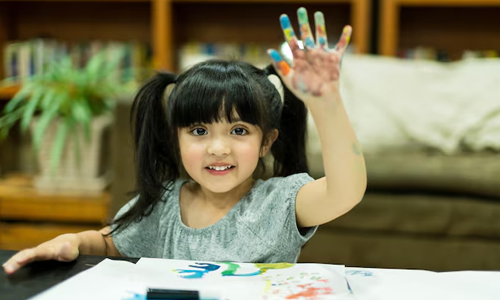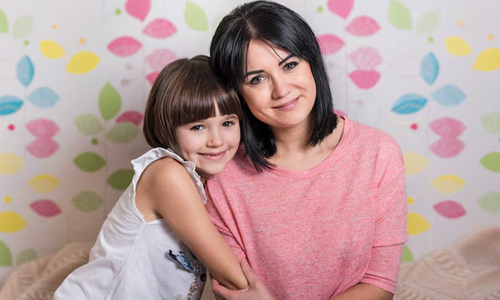As a mother, there’s nothing more comforting than knowing your child is happy, especially when they’re away at school for the majority of the day. We send them off, hoping they’re thriving not just academically but emotionally as well. After all, school is a place where our children grow, form relationships, and build a foundation for their future. But how do we really know if they’re happy at school? Here are some signs that I’ve noticed in my children, and I hope these signs can help you recognize whether your little one is content and happy at school. I’ll walk you through them.
What Does a Happy Child at School Look Like?

Before we dive into the signs, let’s take a moment to understand what happiness at school really means. A happy child is one who feels secure, accepted, and engaged in their school environment. They look forward to going to school, they talk about their day with excitement, and they come home with stories that make your heart smile. As mothers, we sometimes worry about whether our children are thriving in every way, and that’s completely normal. But there are ways we can tell if our children are content and happy at school, even if they’re not always forthcoming with their feelings.
10 Signs That Your Child Is Happy at School
1. Excitement About Going to School

One of the first things you should watch for is how your child reacts when it’s time to head off to school. If your child wakes up in the morning ready to get dressed and head to school without much fuss, it’s a great sign that they’re enjoying their time there. I’ve noticed with my kids that when they’re truly happy at school, they’re eager to start their day. They’ll talk about what’s coming up—whether it’s a special class activity, seeing their friends, or even just looking forward to lunch break! That enthusiasm is a clear indication that they feel comfortable and engaged in their school environment. But, of course, we all have days when we just don’t feel like going, and that’s okay. It’s when the reluctance becomes frequent that it’s worth digging deeper into why they might not want to go.
2. They Talk Positively About Their Day

As mothers, we love hearing all the little details about our children’s day, and when they’re happy at school, they can’t wait to share! Whether it’s a funny story about a classmate, something exciting they learned in science, or just how much they enjoyed recess, these stories are a window into how they’re feeling. Pay attention to how they describe their interactions with teachers and friends. Positive and cheerful descriptions are a great sign that they’re emotionally content.
3. Engages in Schoolwork with Enthusiasm

Another big sign that your child is happy at school is when they show enthusiasm for learning, even at home. If they’re taking an interest in handling their homework or school projects, it means they’re connecting with what they’re learning in class. I’ve seen it with my children—when they’re excited about a topic, they’ll spend extra time on their schoolwork, ask questions, and even talk about it during dinner. This eagerness shows that they’re enjoying their academic journey.
4. Healthy Social Interactions

Friendships are such an important part of a child’s happiness at school. When your child talks about their friends and social experiences, and you see them developing close bonds, it’s a sign that they feel accepted and valued by their peers. I always find it heartwarming when my child tells me about their best friend or the games they play at recess. Good social interactions also mean your child is learning important life skills like cooperation and empathy, which contribute to their overall happiness.
5. Good Emotional Well-being

A happy child is usually emotionally stable. If your child comes home in a relatively good mood, is calm, and doesn’t exhibit frequent meltdowns or anxiety about going to school, it’s a positive sign. Of course, all kids have their off days, but if your child seems generally content, with no major signs of stress or frustration about school, you can be reassured that they’re emotionally healthy in their school environment.
6. Healthy Appetite and Good Sleep

Believe it or not, happiness at school can even show up in your child’s appetite and sleep habits. When my child is stress-free at school, they seem to have a regular appetite and go to bed without much fuss. There are no complaints of stomachaches or trouble falling asleep because they aren’t anxious about the next day. If you notice your child’s appetite is steady and their sleep is peaceful, it could be a sign that they’re emotionally settled. On the flip side, if they’re skipping meals or having trouble sleeping, it might be worth checking in to see if there’s something on their mind.
7. Enthusiasm About Learning

I’ve always loved it when my child comes home with a head full of questions. Whether it’s “Why is the sky blue?” or “How does a plant grow?”—this curiosity is a wonderful sign that they’re happy at school. When kids are eager to learn, it shows they’re engaged and excited about the new things they’re discovering each day. And it’s not just the questions. If your child takes it upon themselves to do extra work without being reminded, that’s a huge win. It’s a sign they’re enjoying the learning process and feeling confident in their abilities.
8. Positive Communication about Teachers

One thing I always pay attention to is how my child talks about their teachers. When a child has a positive relationship with their teacher, it’s usually a sign that they’re happy and feel supported in the classroom. They might talk about a funny thing the teacher said, or how much they love their favorite subject because of the way the teacher explains it.
9. Handling Challenges Positively

No school experience is complete without challenges. There will always be tricky tests, difficult assignments, or occasional conflicts with friends. But the way your child handles these challenges can tell you a lot about their emotional well-being. If your child is happy at school, they’re more likely to bounce back from setbacks. Maybe they had a hard day with a class project, but they come home and say, “I’ll try again tomorrow.” That’s resilience. It shows they feel supported and confident enough to face challenges without being overwhelmed.
10. Seeking Social Connections Outside School

When my child asks for playdates or to spend more time with friends from school, I take that as a sign they feel connected socially. Happy children want to maintain those relationships even outside of school hours. They might ask to invite a friend over, or just talk non-stop about how they can’t wait to see their friends the next day. If your child enjoys spending time with their school friends after hours, it shows that they’re building meaningful relationships and feeling happy in their school community.
When to Be Concerned: Signs of Unhappiness at School

While we always hope our children are happy at school, sometimes there are signs that they might be struggling. If your child suddenly starts resisting going to school, comes home withdrawn, or talks less about their day, it might be time to dig a little deeper. Behavioral changes, frequent complaints about stomachaches or headaches (which could be anxiety-related), and a decline in academic performance could all be indicators of unhappiness. Trust your instincts and have open conversations with your child, as early intervention can make all the difference.
How Parents Can Encourage School Happiness?

As mothers, we can play a huge role in making sure our children remain happy at school. Here are a few ways we can help them:
1. Open Communication with Your Child
Always make time to talk with your child about their day, even if they don’t seem chatty at first. A simple “Tell me one fun thing you did today!” can open the door to meaningful conversations about their school life. A good parent should have good listening skills. Be patient and give them the space to express their feelings, whether positive or negative.
2. Engage with Their Teachers
Building a good relationship with your child’s teacher can provide you with valuable insights into how they’re doing both academically and emotionally. Regular check-ins, whether through emails or parent-teacher conferences, can give you a clearer picture of your child’s experience at school.
3. Promote Balance
Encourage a balance between schoolwork, playtime, and downtime. Sometimes kids feel overwhelmed by school pressures, so ensuring they have time to relax and play is just as important. A happy, well-rested child is more likely to enjoy school.
4. Support Social Development
Help your child nurture their friendships. Whether it’s scheduling playdates or encouraging them to join a school club, social interactions are key to happiness at school. Strong friendships give children a sense of belonging and comfort.
At the end of the day, we all want our children to not only succeed academically but to feel happy, confident, and secure at school. As mothers, we know our children best. If your instincts are telling you that your child is happy at school, trust that feeling. And if something feels off, don’t hesitate to explore it. With a little attention, encouragement, and love, we can help them thrive both academically and emotionally. So, keep those conversations going, keep supporting their growth, and always remember—you’re doing an amazing job!
Here’s to raising happy, resilient, and confident little learners!
Linda
Related posts
Women Tips
Privacy Overview
| Cookie | Duration | Description |
|---|---|---|
| cookielawinfo-checkbox-analytics | 11 months | This cookie is set by GDPR Cookie Consent plugin. The cookie is used to store the user consent for the cookies in the category "Analytics". |
| cookielawinfo-checkbox-functional | 11 months | The cookie is set by GDPR cookie consent to record the user consent for the cookies in the category "Functional". |
| cookielawinfo-checkbox-necessary | 11 months | This cookie is set by GDPR Cookie Consent plugin. The cookies is used to store the user consent for the cookies in the category "Necessary". |
| cookielawinfo-checkbox-others | 11 months | This cookie is set by GDPR Cookie Consent plugin. The cookie is used to store the user consent for the cookies in the category "Other. |
| cookielawinfo-checkbox-performance | 11 months | This cookie is set by GDPR Cookie Consent plugin. The cookie is used to store the user consent for the cookies in the category "Performance". |
| viewed_cookie_policy | 11 months | The cookie is set by the GDPR Cookie Consent plugin and is used to store whether or not user has consented to the use of cookies. It does not store any personal data. |

